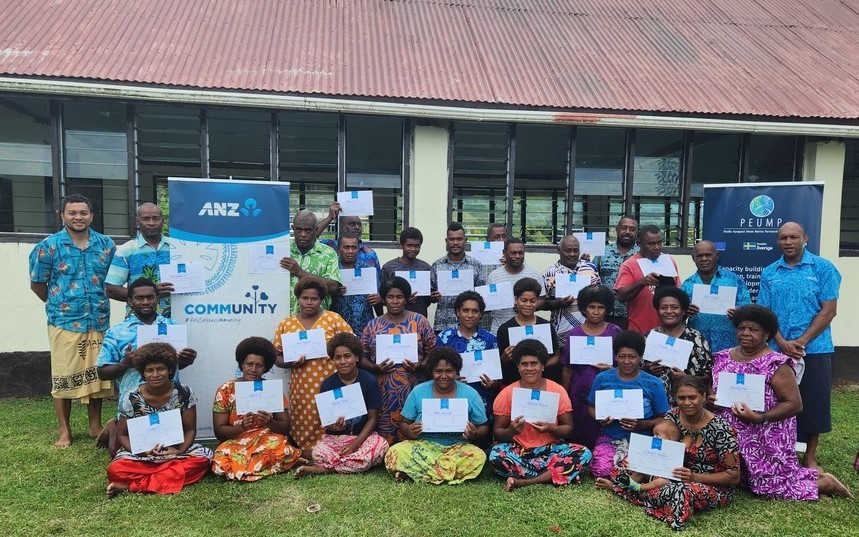Related News

The University of the South Pacific (USP) component of the Pacific-European Union Marine Partnership (PEUMP) Programme in collaboration with the Australia and New Zealand Banking Group Limited (ANZ) successfully delivered its second community-based financial literacy training on Monday, 27th March at Salevukoso Village in Vanua Levu, Fiji. This training is part of the Money-Minded Financial Literacy Program planned for a number of Fiji’s fishing communities, with the aim to empower and equip coastal fishers with financial knowledge and know-hows on how to manage their earnings from coastal harvests.
“Though we regularly obtain money selling our harvests from the sea, we are often unable to financially plan and save for the coming weeks or future. This training is a welcome introduction into how we can save and budget our earnings especially for our long-term goals as well.” Vika Leba, training participant and fisherwoman from Delaivadra Village on Druadrua Island.
The training was conducted in local iTaukei language with the aim to bridge knowledge gaps for communities.
Savenaca Nabavuka, fisherman at Salevukoso village in Druadrua expressing his gratitude said, “I am grateful to USP/ANZ team for bringing this important training to our village and communities. Most of us fishers have trouble with managing our fishing earnings so this training will surely help us moving forward. And I am very grateful to the USP and ANZ team for bringing this training to my village and neighboring fishing communities”.
Key outcomes of these learnings were centered around identifying needs and wants, budgeting, sustaining money until the next harvests and future financial plannings.
“Taking these awareness trainings to fishing communities can be life-changing to skillful fishers who may otherwise have no access to financial literacy programmes and qualifications” said Dr Jokim Kitolelei, Lecturer and USP PEUMP team member coordinating this program. ”We will continue to invest in MoneyMinded in the Pacific because the financial wellbeing of these fishing communities is equally important”.
This Money-Minded Program will be rolled out as well in other parts of Fiji; followed by Solomon Islands, Timor Leste, and Vanuatu in collaboration with the ANZ country offices.
USP is one of four key implementing partners of the EUR 45million PEUMP Program, which aims to promote sustainable management and sound ocean governance for food security and economic growth while addressing climate change resilience and conservation of marine biodiversity. It follows a comprehensive approach, integrating issues related to ocean fisheries, coastal fisheries, community development, marine conservation and capacity building under one single regional action. The PEUMP project is funded by the European Union and the Government of Sweden; and housed within the Institute of Marine Resources within the School of Agriculture, Geography, Environment, Ocean and Natural Sciences (SAGEONS) of USP.
About us
The Pacific-European Union Marine Partnership (PEUMP) Programme addresses some of the most serious challenges faced by Pacific countries. Among these are the increasing depletion of coastal fisheries resources; the threats to marine biodiversity, including negative impacts of climate change and disasters; the uneven contribution of oceanic fisheries to national economic development; the need for improved education and training; and the need to mainstream a rights-based approach and to promote greater recognition of gender issues to ensure inclusiveness and positive changes for Pacific island people. The seven-year PEUMP programme is funded by the European Union (EUR 35 million) and the government of Sweden (EUR 10 million). It is implemented by the Pacific Community (SPC), the Forum Fisheries Agency (FFA), the Secretariat of the Pacific Regional Environment Programme (SPREP) and the University of the South Pacific (USP) in close collaboration with Non-Government Organisations and the national authorities.